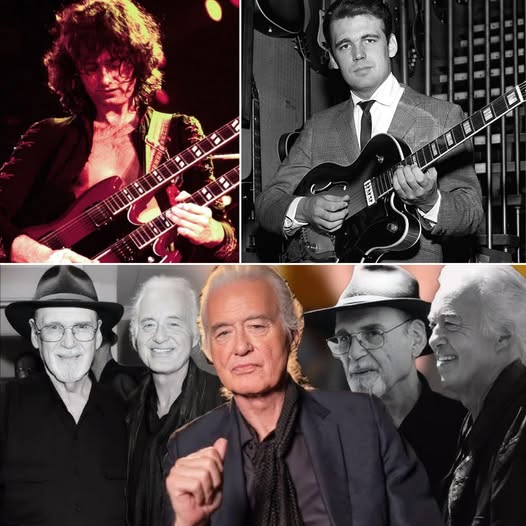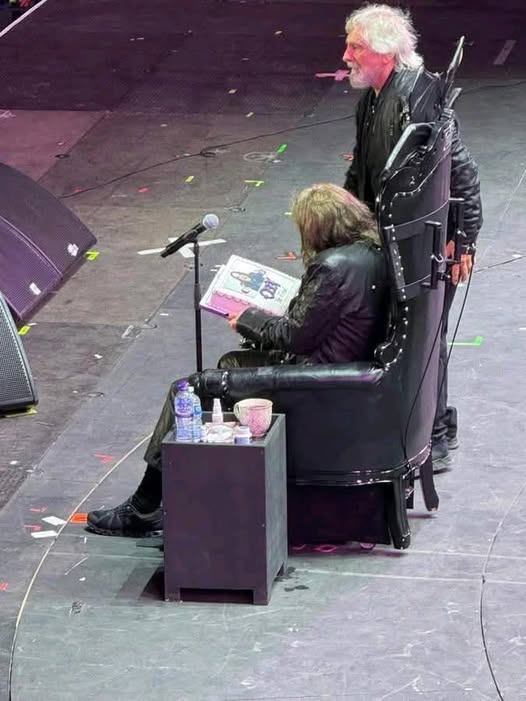Long before Jimmy Page became a household name, carving his iconic signature into the annals of rock history with Led Zeppelin, there was a simpler, quieter moment in his youth that ignited the fire that would later shape some of the most legendary guitar riffs in music. At the time, Page was a teenager, not yet the master of the six strings he would soon conquer, but deeply entranced by a sound that seemed to echo through the airwaves, resonating with a sense of mystery and power.
It wasn’t the celebrated blues giants or the British rock royalty that first sparked his obsession with the guitar. No, for Page, the sound that ignited his passion was far more elusive, far more cinematic. It was a deep, reverberating twang — the kind that rose up from the American desert and cut through the radio with the force of a thunderclap.
That sound came from Duane Eddy, and it forever changed the way Jimmy Page would approach the guitar.
🎶 The Birth of a Guitar Obsession
In the early ’60s, while British rock was still taking shape, a teenage Jimmy Page sat in his room, tuning into the radio. The airwaves were alive with the sounds of The Shadows, The Ventures, and a growing list of blues artists, but it was the twang of Duane Eddy’s guitar that made a lasting impression. For Page, it wasn’t just music; it was an experience. A cinematic moment wrapped in a simple yet profound sound.
Duane Eddy’s signature style — characterized by his echoing, deep twang — was a product of the innovative use of reverb and a unique playing technique. Eddy’s compositions weren’t just songs; they were vast, open spaces that seemed to transport listeners to the rugged landscapes of the American Southwest. In the midst of the swinging ’60s, this sound stood apart, offering something new, something raw and untamed.
Page later recalled hearing those famous instrumental hits like “Rebel-‘Rouser” and “Because They’re Young”. These tracks didn’t just play in the background of his youth — they carved their way into his very soul. Eddy’s twang wasn’t just a sound; it was a declaration. It was as if the guitar had the power to speak louder than any words ever could, to convey emotion and narrative without ever needing to utter a single lyric. It was electrifying, magnetic, and deeply compelling.
🎸 The Sound of the American Desert
For Jimmy Page, the twang of Duane Eddy’s guitar became synonymous with an era of American desert landscapes, wide-open roads, and cinematic drama. It was a sound that cut through the noise of the rapidly changing music scene, and it was the beginning of Page’s lifelong fascination with the possibilities of the electric guitar.
While many young guitarists at the time were exploring the blues — and undoubtedly, blues greats like Muddy Waters and B.B. King would play their own pivotal roles in Page’s musical journey — it was the cinematic quality of Eddy’s sound that captivated him. It was something different. Something that inspired Page to think beyond the traditional confines of the guitar and toward the possibility of creating larger-than-life soundscapes.
That “thunderclap” of a twang seemed to rise from nowhere, as if it were something larger than life. It was a sound that made the air feel alive, full of energy and motion. For Jimmy Page, the electric guitar wasn’t just an instrument; it was a tool that could capture and shape that same power, creating echoes and reverberations that told stories all their own.
💥 From Teenager to Rock Icon: The Influence of Duane Eddy
As Page matured and his musical journey took him from session guitarist to a member of iconic bands like The Yardbirds, he never forgot the impression that Duane Eddy’s twang had made on him. Every string he plucked and every riff he crafted was in part a reflection of that moment in his teenage years when the sound of Duane Eddy’s guitar had shaken him to his core.
It’s easy to trace the threads of influence that have permeated Page’s musical career. From the thunderous power chords of “Whole Lotta Love” to the intricate melodies of “Stairway to Heaven,” there is a cinematic quality in Page’s guitar playing that mirrors the very essence of Eddy’s sound. The echoes of Duane Eddy’s influence can be heard in every sweeping, dramatic soundscape Page would create as part of Led Zeppelin, where his use of reverb, distortion, and sustain would transport listeners to worlds beyond their own.

In a way, Duane Eddy taught Page how to make the guitar speak — how to turn it into an instrument capable of telling stories without words, an instrument that could evoke deep emotion and transport listeners into otherworldly spaces. Eddy’s influence on Page wasn’t just about technique; it was about conceptualizing the guitar as an expressive tool, one that could shape the very mood and narrative of the music itself.
🔥 The Power of Simplicity
One of the most profound lessons Page learned from Duane Eddy’s sound was the power of simplicity. While many guitarists at the time were playing complex, fast-paced solos, Eddy was a master of restraint. He didn’t need to play a thousand notes in a single phrase; with each resonating twang, he could create a mood, a feeling that lingered long after the song ended.
For Page, this became a cornerstone of his own style. Some of Led Zeppelin’s most famous guitar riffs are built on simple, powerful figures that convey emotion with just a few notes. The intro to “Stairway to Heaven” — with its delicate yet evocative lines — is an excellent example of how Page learned to harness the power of simplicity, creating an unforgettable melody that doesn’t need to shout to make an impact.
🌍 An Enduring Legacy
While Duane Eddy’s music may not be as universally recognized as some of the other greats, his influence on Jimmy Page and countless other musicians cannot be overstated. It was Eddy’s sound that first showed Page the potential of the guitar as a storyteller, and that influence can still be felt today.
Eddy’s signature twang — now immortalized in tracks that have long withstood the test of time — was the starting point for a journey that led Jimmy Page to become one of the most iconic guitarists in history. For Led Zeppelin fans, for anyone who has ever been mesmerized by the haunting beauty of Page’s guitar work, it all began with a simple twang that spoke louder than words.
Jimmy Page never forgot the lessons he learned from Duane Eddy, and in turn, he carried those lessons forward into his own legendary career, shaping the sound of rock ‘n’ roll for generations to come.
🌟 Conclusion: The Twang That Echoes Forever
In the end, it’s the power of the guitar — the simple, undeniable magic of making six strings speak louder than anything else — that defines not only Jimmy Page’s career but the very essence of rock music itself. It all started with that one electrifying moment when a teenager, sitting by his radio, first heard Duane Eddy’s twang and felt his soul ignite.
For Jimmy Page, and for millions of fans across the globe, that sound has never stopped resonating. It’s a sound that will continue to reverberate through the airwaves, through guitar amps, and through the hearts of anyone who believes in the power of music to speak louder than words.


